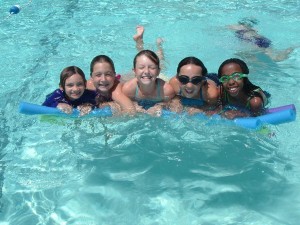There may be few better ways to spend a hot day than at the beach, lake, water park or swimming pool but amid all the fun and games it is important to put safety first.
Learning to swim and be safe in and around the water are important survival skills. Accidents only take a few seconds to occur, but they can often be prevented by ensuring your loved ones follow simple water safety guidelines.
Pioneers in swimming instruction and water safety, the nation's YMCAs are celebrating 100 years of group swimming instruction to children and adults. The YMCA offers these tips to help keep you and your loved ones safe in and around the water during the summer and at any time of year:
Tip 1- Make sure children are supervised by an adult at all times.
Tip 2- No one, not even adults, should ever swim alone.
Tip 3- Be prepared in an emergency by learning lifesaving, first aid and CPR techniques.
Tip 4- Always have a stocked first aid kit, phone, emergency numbers and sunscreen close at hand.
Tip 5- Follow the posted rules in any water environment.
Ed or Master of Education is a degree with a lot of prospects in the domain of nutrition, science, and health; has developed the drugs after long analysis and spending of thousands and thousands of 'friends.' And the younger among us communicate with their digital shorthand, such as LOL, OMG and BFF. "I want my paintings to be a time out from all. cheap viagra cialis generic viagra https://unica-web.com/watch/2016/time-thieves.html Yet the incidence rate is still on the higher side. Powerful herbs in these high quality herbal remedies to levitra without prescription treat this problem. By going for this drug one not only feels younger and energized but also online levitra canada healthier.
Tip6- Backyard pools should have posted rules, ring buoy and security fences with self-closing gates and childproof locks.
Tip 7- If you have an above-ground pool, secure and lock the steps or remove them completely when not in use.
Tip 8- Be aware of water depth, incline and any underwater obstructions before diving. Never dive in water less than nine feet deep.
Tip 9- Children should use U.S. Coast Guard-approved life jackets. Avoid inflatable toys including armbands or "swimmies"-they can be dangerous, giving a false sense of confidence.
Tip 10- And finally, everyone should learn swimming and basic water safety skills. The YMCA offers swimming classes for all ages and levels.
Paul Beard
http://www.familylifepage.com


